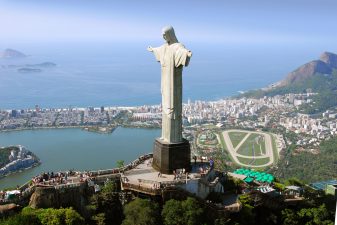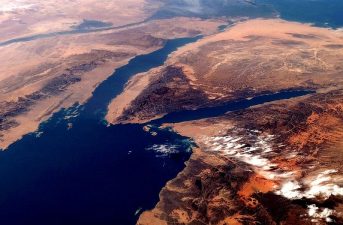 I speak to Qatar-based environmental researcher Mari Luomi about the balancing act Qatar has to perform at the upcoming climate summit
I speak to Qatar-based environmental researcher Mari Luomi about the balancing act Qatar has to perform at the upcoming climate summit
You could say that Mari Luomi’s environmental education began at a very early stage. Wandering through the forests and lakes of Finland when young, she explains that she learnt very quickly that human societies formed a part of the Earth’s ecosystems- and not vice versa. This love and interest in nature later developed into a fully-fledged career and she is now a Post-Doctoral Fellow looking at the environmental issues facing Gulf nations at the Center for International and Regional Studies of Georgetown University in Qatar. In the run of the climate summit in Qatar later this year, I caught up with her to talk politics, the challenge of behaviour change and what an OPEC nation with the world’s largest per capita carbon footprint has to offer the international community in terms of dealing with climate change.
Despite what you may have been told, when it comes to environmental issues, the Gulf nations are not a homogeneous mass. There are those who are trying to push forward and diversify their economies towards low-carbon and there are those that are, well, not. Luomi explains that the Gulf monarchies are not only worried about their continuing dependency on fossil fuel exports, but their domestic consumption of energy and water too, which has grown so fast in the past decade that it is now significantly eating away from valuable export revenues and turning most into net importers of natural gas. However, rather than aiming to reduce demand and encourage conservation they are still mostly trying to increase supply of energy and water. They want more rather than focusing on using less and this is hugely problematic.

According to the latest statistics Qatar, where you are currently based, has the largest ecological footprint of the region (and world!). Do you think the government, businesses and civil society are doing enough to change that?
The interesting thing about this indicator is that it factors out the consumption and emissions of a country’s exports while including those of imports. So in Qatar’s footprint, we only have the impact of what is actually consumed here. All emissions of the massive gas and oil export industry are excluded. Shockingly, despite the fact that 57% of Qatar’s population in 2008 (for which the figures are) consisted of low-wage migrant labourers, the average resident still consumed 6.5 times the Earth’s carrying capacity.
Qatar is hot and arid, and has a high per capita income, but these alone do not explain the overshoot. A lot, unfortunately, boils down to lack of awareness and indifference. Few people here seem to be aware the environmental consequences of their actions. This applies to all segments of the population, including most Western expatriates, albeit for different reasons. In 2008, the government launched a document that outlines the country’s objectives for the next two decades and the environment was one of the four main areas of focus. A short-term planning document that followed proposes a number of pertinent measures both on the supply and demand side.
Still, missing are strong incentives for businesses and individuals to change behaviour and practices that are environmentally unsustainable. High subsidies and lack of enforcement remain two major obstacles on the road to sustainability. A lot of blatant greenwash by companies also goes on unimpeded due to the weak CSR culture and generally low awareness of environmental issues.
With Qatar hosting climate talks in November/December, do you think this will change anything long-term in terms of environmental action in the region? And why was Qatar eager to host the climate summit?
Ironically, while most countries are currently struggling with economic crises, Qatar is one of the few countries where the economy and natural resource consumption have kept growing, largely thanks to natural gas. The dire global economic situation has become a major impediment to increased global ambition to fight climate change. In Qatar, this is not an issue, but here too, economic considerations still continue to override environmental ones. Also, emissions are a sensitive issue to the OPEC exporters on so many levels. Qatar, like other Middle Eastern states, is still classified as a developing country, which means that it currently has few obligations vis-à-vis the international climate regime.
Hosting major international events is part of Qatar’s foreign policy. It is also aimed at creating a brand and diversifying the economy. Having the UN climate conference in Doha this year also follows a trend of Qatar ‘punching above its perceived weight’ in foreign relations. And yet again, we’re facing a risky bet. If Qatar manages the double task of brokering a successful conference outcome and balancing its interests as an OPEC member with those of a dynamic, forward-thinking state seeking to live beyond oil and natural gas, then we might see positive reverberations both domestically and regionally. The very optimistic scenario is that the conference will give rise to a new regional leader in climate change mitigation and open the floor for a frank discussion on domestic environmental problems.
Your book ‘The Gulf Monarchies and Climate Change: Abu Dhabi and Qatar in an Era of Natural Unsustainability‘ will be published later this year to coincide with the UNFCCC meeting in Qatar. What were the major findings of the book?
In late 2007 I became fascinated with two seemingly contradictory events in the region: Saudi Arabia, along with three other Gulf OPEC states, known for their controversial role in the international climate negotiations, announced the creation of a US$750 million fund for Research & Development into clean-tech. At the same time, Abu Dhabi was gearing to start construction at Masdar City and announce a civilian nuclear energy programme.
The original question that inspired me was the one we’ve heard a thousand times since: why would an oil exporting state invest in alternative energy? My next questions were: what is driving these developments? Are there regional differences? And what does this possible shift in attitude entail for international climate politics? Answering these questions led me to more questions, including why, despite so much havoc to the sensitive desert environment caused by the last decade’s explosive growth, does the environment continue to be a marginal issue in most of the Gulf monarchies?
In the book, I explore these questions and try to answer them. I examine the two most dynamic monarchies to have taken at least some steps towards lower-carbon economies: Abu Dhabi and Qatar. Fundamentally, however, the book sends a strong message about the difficulties of trying to sustain the environment in fast-growing societies that are still so pervasively impacted by fossil fuels.
What change is needed to help the Gulf nations in particular take environmental issues and climate change more seriously?
No doubt it’s the people that need to change, eventually, if we are to save this region. Values need to change. Governments have a crucial role in initiating the change by making large structural improvements with the help of technologies and efficiency; passing laws and enforcing them; initiating awareness-raising campaigns; steering consumption through pricing, and so on. Wealth accumulation and material consumption should not be our primary goals in life. I have an idea of what should be done to change this, and it involves actions on the very top and among young nationals. I’m just afraid that I am still in a trivial minority with my thoughts and that change in many countries is coming too slow.
For more on the UNFCC meetings and the Middle East see:
Qatar (Still) Had the World’s Largest Carbon Footprint
Interview: Green Buildings and Next Climate Summit in Qatar
Despite Best Intentions, Gulf Countries Can’t Quit CO2
#Occupy Climate Change: The Arab Spring and Occupy Wall St.
Image of celebrations in Qatar from Shutterstock



